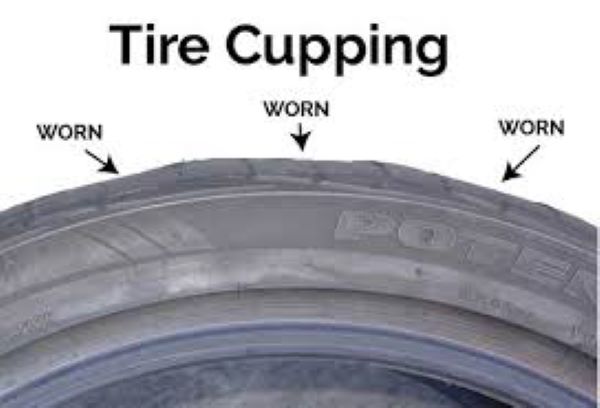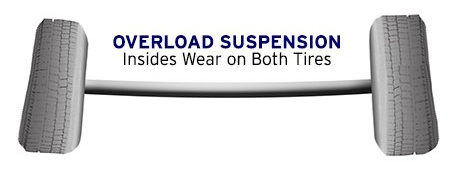Most Common Truck Failures on the Road: Wear and Tear of Tires
Most Common Truck Failures on the Road: Wear and Tear of Tires
.png)
As a truck driver, you depend on the health and condition of your truck. That is especially true if you own your truck.
Small issues now can compound into expensive issues later. Because of this, it is important that you can spot the warning signs of truck failure before they become roadside problems.
This is part three in a series discussing the most common reasons for truck failure on the road.
Read about common brake issues here.
Read about issues with truck engines here.
In this post, we will discuss one of the most common issues that lead to roadside problems for truckers, tire wear and failures. Keep reading to learn more about how you can spot signs that your tires are in jeopardy and what you can do to prevent truck failure.
These are the Most Common Reasons Your Semi-Truck Tires Wear Down or Fail
Your tires are one of the most important parts of your truck. In combination with your brakes, your tires are responsible for traction on the road. Healthy treading is vital for stopping efficiently and hauling long distances. Any tire failure can result in disaster and create unsafe working conditions for you as the driver and other people on the road. For trucks that haul between 42,000 and 48,000 pounds, regular tire replacements and tire inspections are a necessity.
What do you need to know to effectively look after the health of your semi-truck’s tires?
Below we will look at the most common contributors to tire failure, irregular wear, over and under inflation, overloading, and lack of maintenance.

Irregular Wear
Irregular wear occurs when your tires wear unevenly. This can lead to roadside problems or even problems stopping. If you notice irregular wear on your tire, replacement is necessary and a diagnostic test to determine the cause of the irregular wear.
The four most common types of irregular wear include:
- Feathering. Where the tread on one side of the tire wears smooth, with the other side having sharp edges. This type of wear occurs as a result of incorrect wheel alignment.
- Cupping. Where there is an uneven wear pattern on the tire tread that resembles scallops or cups. This type is due to worn or damaged suspension components.
- Flat spotting. Where a portion of the tire's tread becomes flat due to long periods of sitting or parking.
- Shoulder wear. Where the outer edges of the tires are worn smooth usually due to underinflation or overloading.
If you notice irregular wear on your semi-truck tires, it is important to get them replaced as soon as possible. Tire wear can lead to reduced fuel efficiency, short tire life, and even unsafe driving conditions.
.png)
Overinflation and Underinflation
Over or underinflation of your semi-truck’s tires can be hazardous for your tires. It is generally recommended that semi-truck tires have an inflation pressure between 80 and 110 psi (though some require higher pressure).
- Overinflation. This issue occurs when the tire is inflated beyond the psi recommended by the manufacturer. This can result in tire wear in the center of the tread, rough rides, reduced fuel efficiency, and a higher risk of tire failure. This issue can also lead to decreased traction and handling performance, making it more difficult to control the vehicle in wet or slippery conditions.
- Underinflation. This issue occurs when the tire is inflated below the psi recommended by the manufacturer. Underinflation can cause your tires to wear unevenly on the outer edge of the tread. This can result in increased rolling resistance, reduced fuel efficiency, and a higher risk of tire failure or roadside problems. It can also cause the tire to generate more heat which can lead to structural damage.

Overloading
Overloading your semi-truck can cause significant problems for your tires. You may get stuck with hefty charges down the line or even penalties and fines. This is why it is so important to adhere to weight limits and load ratings for your specific vehicle and tires.
Below are some issues caused by overloading.
- Excessive tire wear. Too much weight on your tires can cause treading to wear out more quickly and unevenly. This can lead to premature tire failure and reduced overall tire life.
- Blowouts. When you overload the risk of your tires overheating drastically increases. When your tires overheat it can result in a tire blowout while driving, which can lead to an accident.
- Reduced fuel efficiency. When you overload your rig, it increases rolling resistance which leads to reduced fuel efficiency and higher operating costs.
- Handling and stability issues. Too much weight on your rig can cause the tires to lose traction and handling performance. This makes controlling your vehicle more difficult, especially during emergencies.
Lack of Maintenance
Lastly, we will look at how lack of maintenance can negatively impact your semi-trucks tires. Routine maintenance checks can save you large sums of money in the long term and help to extend the life of your truck by years. Basic routine maintenance tasks such as tire rotation, wheel alignment, and inflation checks can help prevent uneven tire wear and tire failures.
Here are some regular maintenance tasks you must perform.
- Oil and filter changes. These should be done between 10,000 and 25,000 miles depending on the type of engine you use and operating conditions.
- Tire maintenance. Tires need to be rotated every 5,000 to 10,000 miles or according to manufacturer recommendations. Wheel alignments should be done at the same interval.
- Brake inspections. Your brakes must be inspected every 3,000 to 6,000 miles.
- Fluid checks. Coolant, transmission, and brake fluid should be checked every time you perform preventative maintenance or every 10,000 miles. However, it is recommended that you perform visual inspections on fluid levels for signs of contamination or discoloration after every trip.
- Air filter replacement. Your air filters should be replaced between 15,000 and 30,000 miles.
Semi-Truck Tire Maintenance at Beamers Piggyback
The health of your truck is essential to keeping you on the road and staying on schedule with your deliveries. Preventative maintenance and regular tire checks will ensure that you are safe and that your truck is up to code with the trucking industry's best practices.
For tire replacements and semi-truck maintenance and repairs, Beamers Piggyback in Cincinnati is here for you.
We are proud to serve truck drivers in Cincinnati and Dayton as your one-stop for all semi-truck repair and maintenance.
Contact Beamers Piggyback today to learn what we can do to keep your truck healthy and on the road!
For more trucking tips and tricks, follow Beamers Piggyback on Facebook and Instagram here!
Happy with the difference we have made for your semi-truck? Leave us a quick five-star review here!
